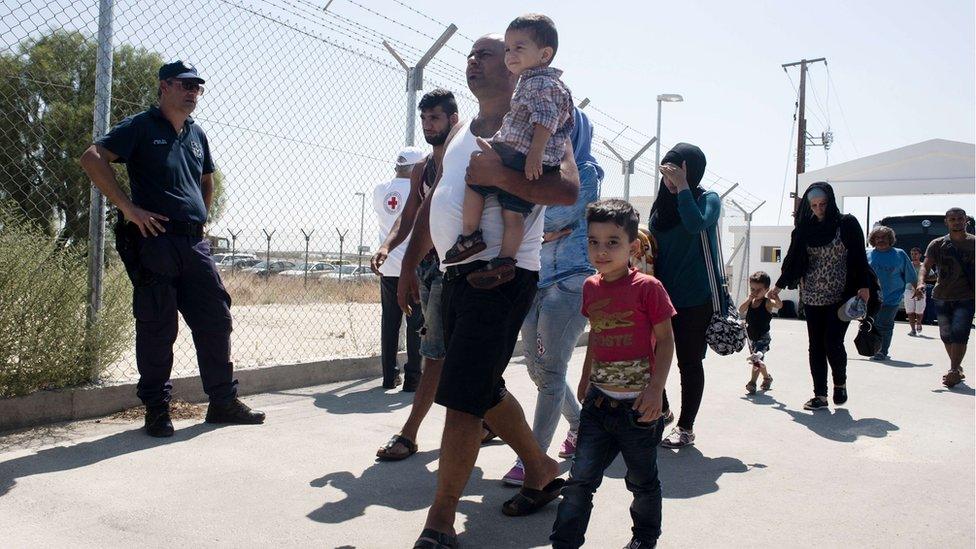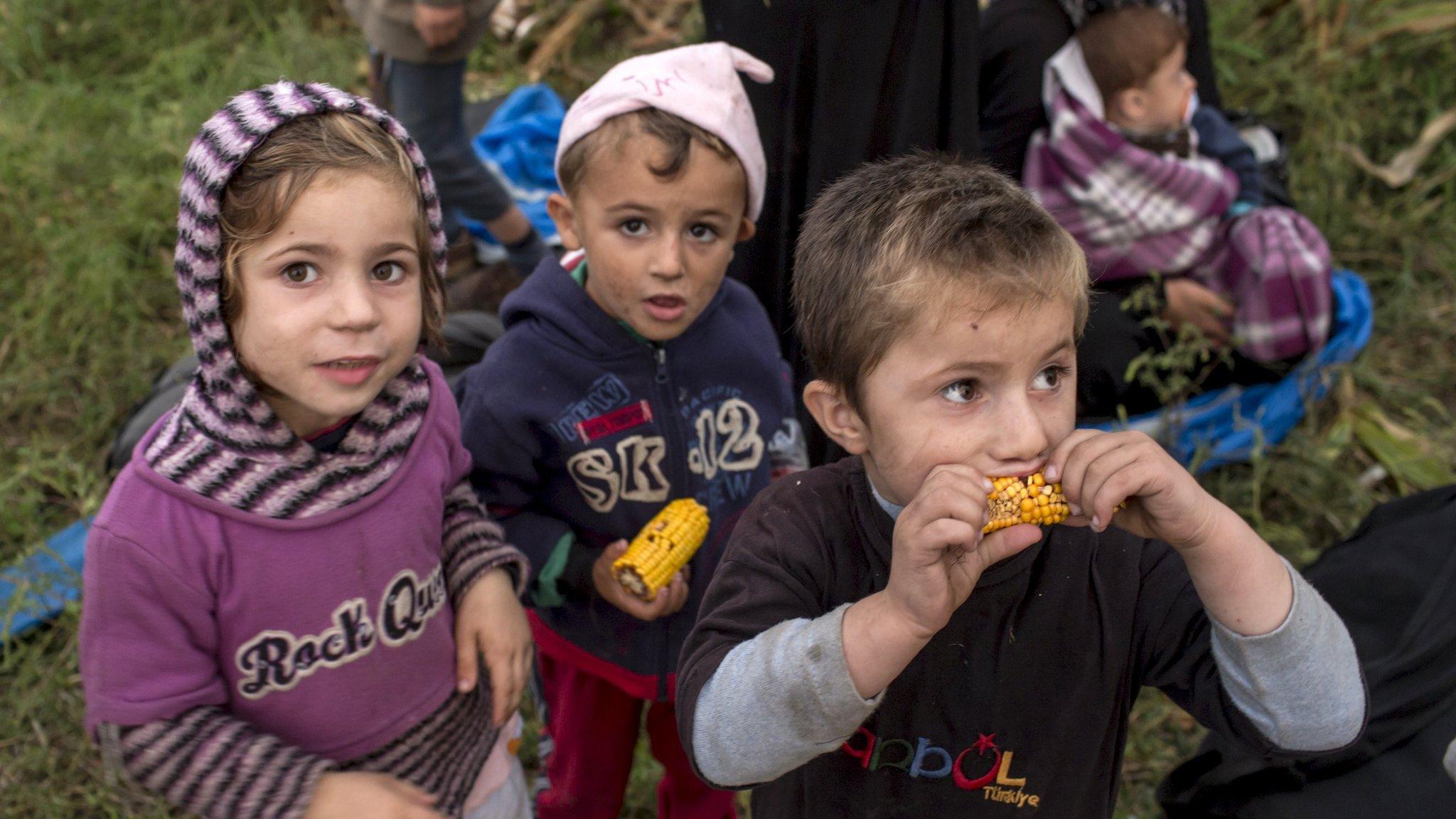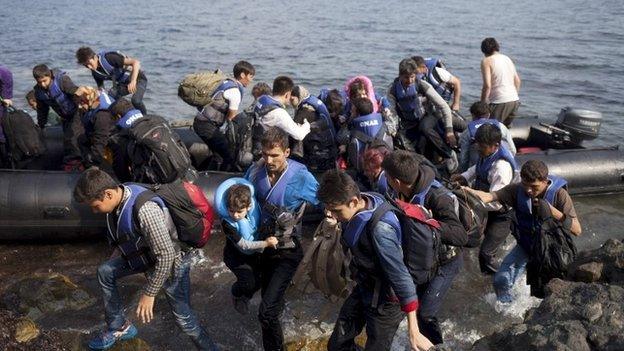Migrant crisis: UK aid budget will help fund refugees response - Osborne
- Published
- comments
George Osborne says the migrant crisis presents "a huge challenge" for the UK
Money from the UK's international aid budget is to be used to help councils house refugees from Syria, Chancellor George Osborne has said.
He told the BBC Britain "needs to do even more" to help refugees and said there should be a "fundamental rethink" of how the UK uses the £12bn budget.
Mr Osborne said the UK would focus on refugees coming directly from Syria.
The prime minister will give details of the government's plan in a Commons statement on the issue on Monday.
David Cameron has previously said the UK will take in "thousands" more refugees from Syria. Mr Osborne would not give a number when questioned on the matter on the Andrew Marr show.
The chancellor also said ministers should make the argument for military action against Islamic State militants in Syria.
'Desperate need'
European countries are dealing with a surge of people fleeing the Middle East and other regions, particularly from Syria, Afghanistan and Eritrea.
Thousands have made their way through Austria since Hungary removed restrictions on transit on Friday. From there, they have been travelling to Vienna and on to Germany.
Some 11,000 asylum seekers arrived in Germany on Saturday, officials there said, with another 10,000 expected to have entered the country on Sunday.
In other developments:
Charities said the British public's response to the refugee crisis had been "extraordinary", with hundreds of thousands of pounds raised so far
The Scottish government pledged £1m for Scotland's response to the crisis
A petition calling for Britain to take more refugees has received more than 420,000 signatures - while a petition saying no more immigrants should be allowed into the UK has received more than 71,000 signatures
A Catholic bishop in Northern Ireland has said there should be a "generous reception" for refugees
Hundreds of people gathered at a "refugees welcome" demonstration in Oxford
He said: "While helping people in desperate need, we should not encourage more families to make that desperately dangerous journey across the Mediterranean and so we think we should go directly to these refugee camps and help people and bring people from those camps to the United Kingdom."

What is the international aid budget?
The government has committed to spending 0.7% of GDP on foreign aid
There is scope for the UK to increase the amount it spends because the international aid budget is tied to the country's GDP - a figure used to measure economic activity - which grew by 2.6% in 2014
Globally, DfID works on schemes aimed at immunising children, providing girls and women with better education and preventing climate change in developing countries
The UK has already spent £1bn to help people escaping the war in Syria
This has been spent on refugee camps along Syria's border, including Turkey, Lebanon and Jordan. Running water, food, medicine and shelter have been provided by the funding

Mr Osborne said there would be "an assessment of what our public services and infrastructure can support".
He added: "But let me say this, the foreign aid budget we have - and we've increased this foreign aid budget - can provide the support in the first year for these refugees, can help local councils with things like housing costs."
There is no indication of how much extra spending from the aid budget will be provided as the government has not said how many more people it will accept.
But Treasury sources told the BBC the "fundamental" rethink of the budget announced by the chancellor would make spending much more flexible.
The BBC's political correspondent Alan Soady says the idea of spending some of the international aid budget both abroad and within the UK may prove to be a controversial one.
The UK spent £100m of its aid budget on asylum seekers in this country over the last financial year, the Treasury says.
Under Organisation for Economic Co-operation and Development (OECD) rules, money spent on the first year of an asylum seeker's stay can count as foreign aid.

Refugees fleeing Syria have been arriving at a camp in Cyprus after their boat ran into trouble off the coast of the island on Saturday night
International Development Secretary Justine Greening said the government was working with UN agencies and NGOs on how to take in Syrian refugees directly from camps in the area.
She told Pienaar's Politics on BBC Radio 5 live that additional aid spending on the crisis would not come from cutting aid spending elsewhere, but from an increase in the overall foreign aid budget.
"As our economy grows that 0.7% gets bigger," she said.
"We recognise because of unprecedented needs that this Syria crisis presents we need to respond and that's got to be how we prioritise that uplift as it goes on."

How could the plan work?
Mr Cameron's plan to take in thousands more refugees suggests he may expand the Syrian Vulnerable Persons Relocation, external (VPR) scheme - although this has not been confirmed.
Under VPR, 216 Syrians have been brought to the UK since March 2014.
People arriving in the UK in need of protection usually have to apply for asylum - and if this is granted they get "refugee" status.
But people brought to Britain under VPR have not gone through this process. Instead, they have been granted Humanitarian Protection, a status normally used for people who "don't qualify for asylum" but would be at "real risk of suffering serious harm" in their home country.
Like people granted refugee status, those given Humanitarian Protection can stay for five years, after which they can apply to settle in the UK.
People in both categories have the right to work and access public funds.

On the possibility of UK military intervention in Syria, Mr Osborne said the government was unlikely to put forward another Commons vote unless it knew it was likely to win parliamentary support.
In August 2013 MPs rejected UK military action in Syria by 285-272. Mr Osborne described it as "one of the worst decisions the House of Commons has ever made".
He said: "Personally I think, the prime minister thinks, the defence secretary and the foreign secretary - we all think there is a strong case, and indeed an argument around coherence, that if you're tackling Isis (IS) on one side of the Iraqi border you should be attacking on the other side in Syria."
The RAF has been carrying out airstrikes against Islamic State targets in Iraq since September 2014 after MPs voted for military action, external in the country.
But Labour shadow home secretary and leadership contender Yvette Cooper said she took a "cautious view" on whether the party would support UK military action in Syria.
She told Sky News: "The big question for all of us should be where is the diplomatic effort coming from to get Syria, to get Russia, Iran, the Gulf states, the US, [the] EU, all pulling together to try to find a long-term sustainable solution."
Syrians seeking asylum in the UK
25,771
people applied for asylum in the UK in the year ending June 2015
2,204
were from Syria
-
87% of Syrian requests for asylum were granted
-
216 Syrians have been granted protection under a special scheme to relocate vulnerable people
-
4,980 Syrian asylum seekers and their dependents have been granted asylum since 2011
-
145 Syrian asylum seekers have been removed from the UK since 2011
- Published6 September 2015

- Published4 September 2015

- Published4 September 2015
